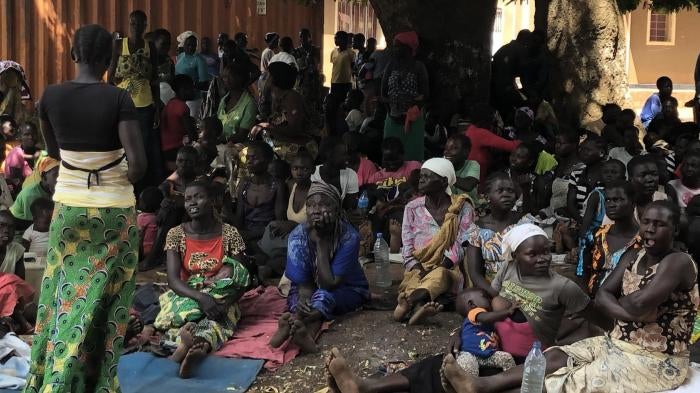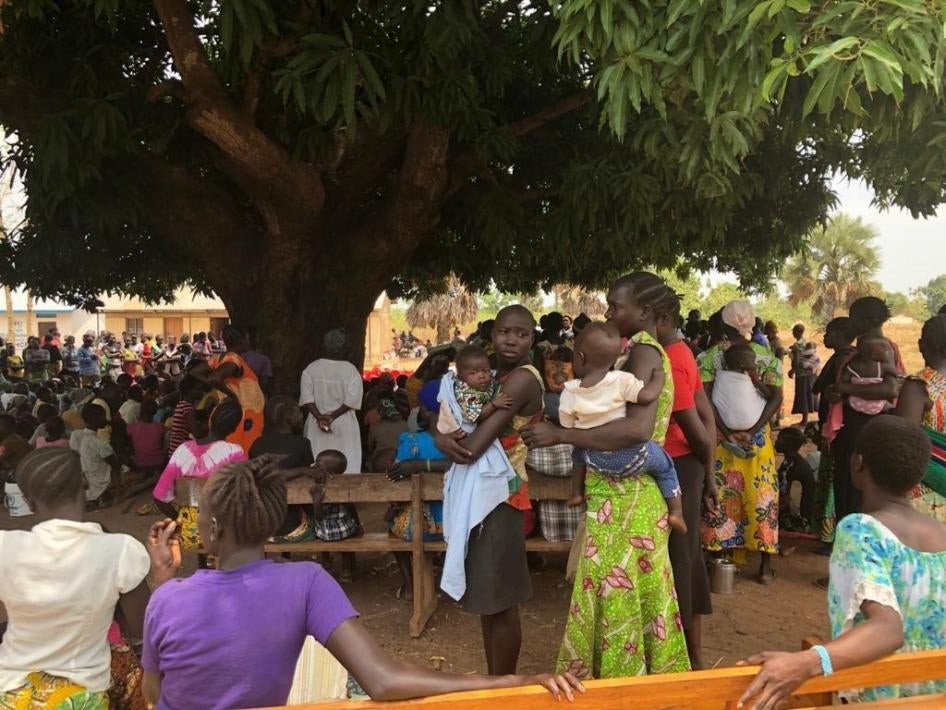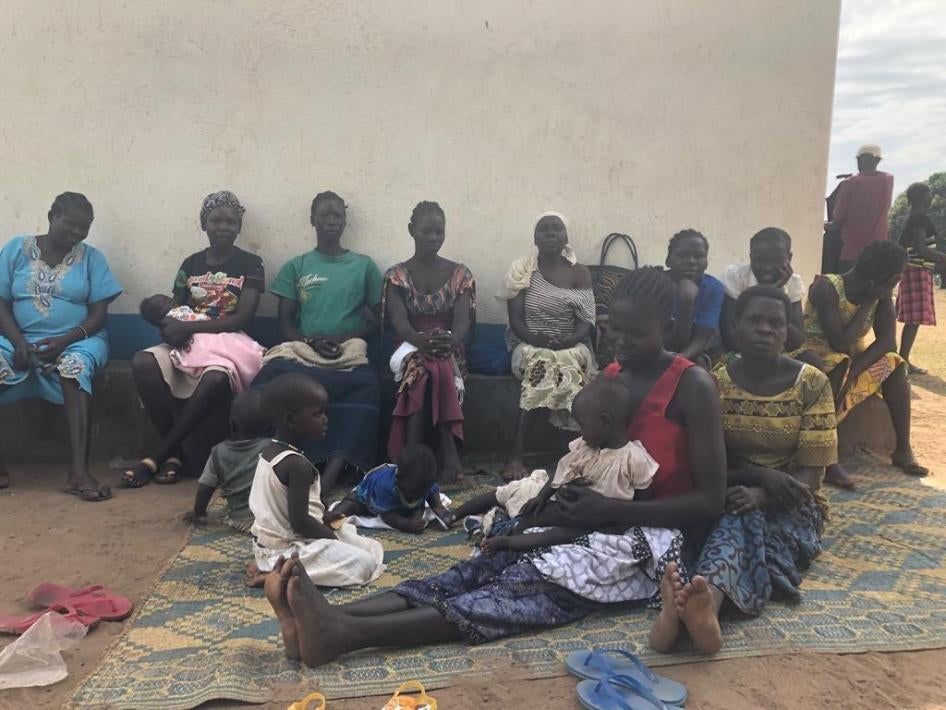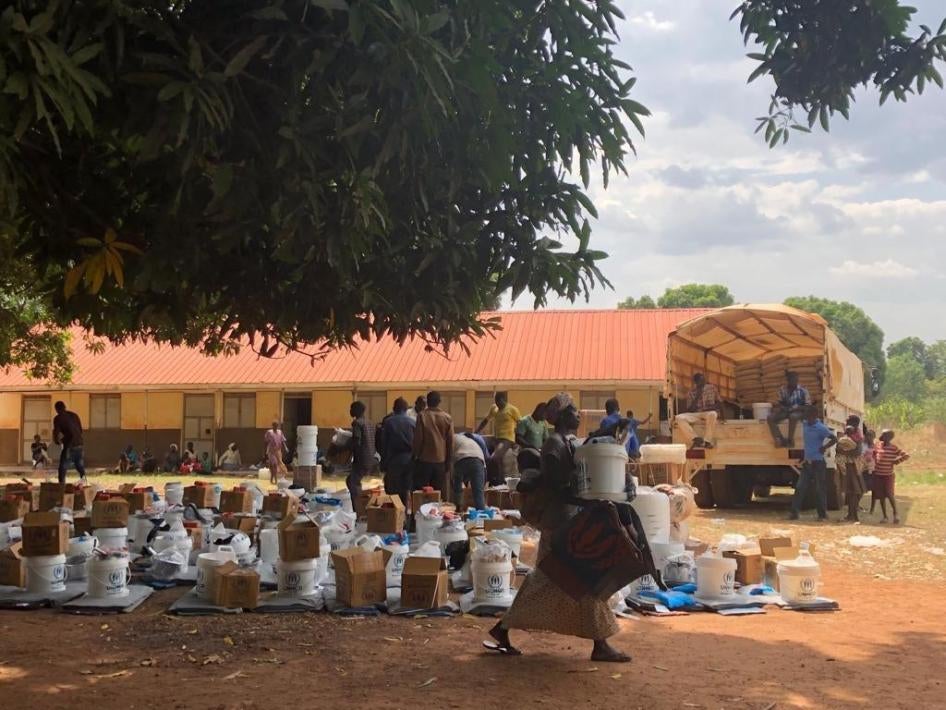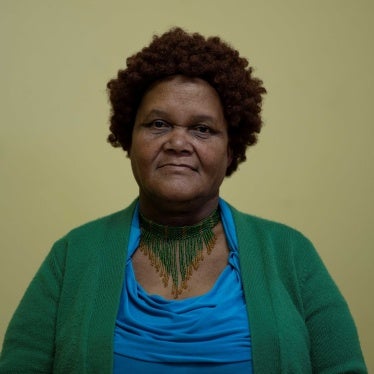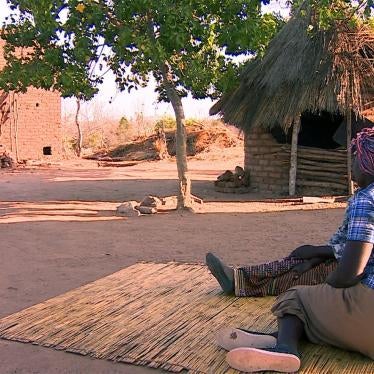(Nairobi) – Government soldiers carried out extensive abuses against civilians during counter-insurgency operations in South Sudan between December 2018 and March 2019 in Yei River state, Human Rights Watch said today.
The soldiers shot at civilians, looted extensively, burned homes and crops, and chased thousands of residents from their villages. Human Rights Watch also documented accounts of rape and sexual violence by soldiers.
“Civilians are being targeted, killed, and raped, as government operations try to root out rebels in Yei River state,” said Jehanne Henry, associate Africa director at Human Rights Watch. “All parties need to put a stop to the crimes against civilians and ensure accountability, while the government should help people regain their homes and livelihoods.”
Between March 14 and 21, Human Rights Watch interviewed 72 displaced people in Yei River state who witnessed the government operations in various locations in Mukaya and Otogo counties. Researchers also spoke with ceasefire monitors, aid workers, UN staff, and state government officials including the governor of Yei River State.
South Sudan’s leaders signed a “revitalized” peace agreement in September based on a collapsed 2015 peace deal, but the conflict continued, primarily in Yei River state, where the National Salvation Front (NAS), an armed group formed in March 2017 by former Deputy Chief of Staff Thomas Cirillo, continues to fight the government forces. Parties to the peace deal were to form a Transitional Government of National Unity on May 12, but that has been postponed to November 12.
While government soldiers were responsible for most of the abuses in the recent operations, rebel groups have over the past two years also attacked civilians and prevented aid workers from reaching civilians in need, Human Rights Watch found. Both National Salvation Front and the Sudan People’s Liberation Movement/Army in Opposition (SPLM/A-IO) under former Vice President Riek Machar abducted dozens of civilians in and around Yei in October and December, credible sources said.
In response to NAS attacks on their positions, starting in December, government forces began operations against the groups in parts of Yei, Lujulo, Morobo, Mukaya, Otogo, and Mugwo counties. The operations caused approximately 9,000 people to flee to the town of Yei and another 5,000 to the Democratic Republic of Congo. In early March, operations displaced approximately 1,400 more people into Yei, according to officials of UNHCR, the United Nations refugee agency.
In most cases, witnesses told Human Rights Watch, rebels had already left the areas before government forces arrived or tactically withdrew during the operations. They said that soldiers surrounded and entered villages in search of rebels, attacked civilians, detaining some, shot in the air or at animals, then proceeded to loot property, destroy and burn homes, and to force everyone to flee.
“They were randomly shelling,” said a 60-year-old man from Morsak in Otego county. “It started on January 30 at 5 p.m. and the next morning they came into the villages with guns shooting at civilians. […] We have 120 households there and they were mostly looted and burned, even the food items.”
A 50-year-old farmer, who witnessed an early March attack on another village in Otogo county, said that soldiers burned crops and looted clothes, bikes, and motorbikes “[They] are now are selling some of our things in the market,” he said.
Several older people and people with disabilities were not able to flee. Nicholas Taban Dario, chief of Pisak village in Otogo county, said that during attacks on the area in March, at least five older people and people with disabilities were left behind, including a blind woman in her 60s and a blind man in his 70s.
Families were also separated during the skirmishes. “After I ran from the shelling, I went to look for my parents at home,” said a 14-year-old boy from Morsak. “Some soldiers were there, they found me and two of them started beating me with a stick on my back and shoulders. I ran away from them and they ran after me shooting at me.” He said he escaped to Yei on foot but did not know where his parents were.
Many of those interviewed in Yei had been displaced by the fighting multiple times. During 2017, approximately 60 to 70 percent of the population in Yei town fled to refugee settlements in Uganda.
Yei River state authorities have denied the scale of displacement. County commissions have pressed displaced people to return home immediately and discouraged aid agencies from providing services to them in town. However, thousands of people remain displaced in Yei, unwilling to risk moving back to their villages and face more fighting and abuse.
Government officials also denied the extent of the violations or the need for justice. The Yei River state governor said that soldiers were “sometimes undisciplined” but that the crimes were not government policy. In late March, weeks after meeting with Human Rights Watch, the governor publicly called on the soldiers to stop harassing civilians. “I want good relationship with the civilians and the bad things done by you [soldiers] must come to an end,” he said. “I want protection and respect for the civilians.”
The government of South Sudan has yet to address accountability, including by making progress in establishing an African Union hybrid court envisioned in the 2015 and 2018 “revitalized” peace deal. The hybrid court would be an important forum to provide justice for the most serious abuses committed in the conflict. South Sudanese authorities should immediately proceed with endorsing an outstanding memorandum of understanding on the court with the African Union Commission. The government’s inaction and long delays meanwhile provide ample grounds for the AU Commission to proceed unilaterally with establishing the court, Human Rights Watch said.
Authorities should go a step further and ensure all displaced people in need have access to humanitarian aid, Human Rights Watch said.
“While the situation now in Yei may be calm, abuses against civilians have not been addressed,” said Henry. “Authorities should acknowledge the scope of the abuses inflicted on civilians, enable justice for victims, and prioritize getting aid to those in need.”
The Conflict in Yei River State
When fighting broke out in South Sudan in mid-December 2013, the Equatoria region in the south near the upper reaches of the White Nile remained relatively calm. However fighting spread to the Equatorias in July 2016, when Machar fled from Juba through Yei River State to the Democratic Republic of Congo.
In 2017, fighting between government forces and an allied militia, Mathiang Anyoor, and the opposition SPLM/A-IO, and abuses by both sides forced hundreds of thousands of civilians to flee to refugee settlements in Uganda. In March 2017, Thomas Cirillo Swaka formed the National Salvation Front (NAS), citing abuses by government forces and Mathiang Anyoor.
The new armed group abducted civilians including aid workers in 2018. A Bangladeshi UN peacekeeper was killed in June on theYei-Lasu road when unidentified armed men opened fire on an aid convoy. The SPLM/IO committed abuses including killings, rape, and abductions. Government forces also committed abuses, including a May 2018 attack on Emmanuel Christian college in Goli, Yei county, killing, raping, beating, and detaining both child and adult students over a 12-hour period.
The September 2018 agreement officially ended fighting between the SPLM/A-IO and the government, but Cirillo did not sign the peace deal and continued to fight the government and the SPLM/A-IO.
In late December, the government began a military offensive to flush out the NAS, starting on the Yei-Maridi road and then moving on to various locations in Mukaya and Otogo counties.
Human Rights Watch researchers who visited Yei River in March could not reach the sites where reported abuses occurred but sought to determine the credibility of many of the allegations by interviewing multiple witnesses to the same events.
Attacks on Civilians, Looting, Displacement
Witnesses interviewed said that soldiers generally shot weapons in the air, but also at animals and people, looted property, and took it away in army trucks or to their barracks on foot. In some cases, they forced civilians to be porters. Some witnesses said that before they fled, they saw soldiers setting fire to homes or bushes near homes.
John, 22, from Lotore in Mukaya county, said soldiers beat him and demanded to know where rebels were, then looted his property:
There were five of them and they beat me on my shoulder and stomach. […] I didn’t know where the rebels were, so I took them to the main road about two miles away. They had taken our clothes, shoes, radio, money, and random other things in the house.
A woman from Morsak in Otogo county said that government forces arrived on January 31 and that she and other villagers fled due to heavy gunfire. Upon returning to her house after five days in the bush, she said, she found “everything was taken.” Soldiers also looted a church in Yondori in Mukaya county, where civilians had stored some of their belongings in the hope that soldiers would not target a church. Interviewees said the soldiers took chairs, benches, plates, and personal property.
“Regina” from Logo in Otogo county, who like some of the others interviewed did not want their real names used for fear of reprisals, said soldiers arrived on March 6, fired shots, and told civilians to flee to Yei town. They then proceeded to loot and burn and to occupy the village for many days. “The soldiers collected my household items and burned my house and other property down,” she said. “I only came with a small bag and my six children. I tried to go back five days later for food but still found soldiers around.”
“Amule,” 56, from Logo in Otogo county said:
The soldiers reached the village and went to the houses and asked, “Where are the people?” A group of about 12 soldiers found me at my home and asked me where my family is. I said they [are] in Yei. Then they pointed a gun at me and told me to say where all the people went. They threatened to torture me. Then they just left, taking my motorbike, 10 goats, food, clothes, radio. Now the house is empty, and I only have the clothes on my back.
“Mary,” from Ombasi in Otogo county, said that during the operation in early February, three government soldiers found her and her grandfather in their home, beat them and forced them to carry looted property:
They wanted me to carry goods for them, but my grandfather stopped them. They beat my grandfather [who is] in his 70s, first accusing him of being a rebel and then told him to carry a bucket of onions, flour, and cassavas to their barracks in Morsak primary school. They hung them on his neck behind his back with a rope. When he collapsed under the weight, the soldiers kicked him and beat him with a rope and stick.
“Aputu,” from Yondori in Mukaya county, said that four soldiers intercepted her and two other women as they fled to Yei in early March. The soldiers made the women carry the four sacks of cassava, groundnuts, and flour that they had carried when they fled to the soldiers’ barracks, then chased the women away, beating them with sticks.
Killings
Human Rights Watch could not confirm the total number of people killed but spoke to witnesses to at least two killings. In one case, government soldiers killed Isaac Malesh, a peasant farmer in his 30s in Goja on February 15. His 28-year-old wife said that she, her husband, and five children had been farming that day and she had gone home to make lunch. Four soldiers carrying guns and in uniform found her and, speaking in Arabic, asked her for something to eat, looted her home, and killed her husband:
When my husband arrived, they asked where he was coming from. He said he was just from the farm. They said you are a rebel. They tied his hands against a tree and slaughtered him with a knife. In front of the children. They then cautioned me that…If you don’t leave here and we return and find you, we will kill you and your children. So, I fled to Yei.
Government soldiers also killed 45-year-old Dennis Lasu Edward, sub-chief in Girim boma, Mukaya county on February 6. A family member who witnessed the killing said two soldiers accused Dennis of being a rebel, told him to accompany them to the barracks, but then shot him in the back on the way there.
The Mukaya county commissioner, Simon Festo, told Human Rights Watch in March that the soldiers responsible for the killing were drunk, were in custody, and would be punished. But Human Rights Watch has not been able to get information about any progress in the case.
Arbitrary Arrests, Beatings, Torture
Government forces arrested and detained civilians, mainly men, on accusations of being rebels or rebel supporters or to force them to provide information about the rebels.
Soldiers arrested a man and his two sons from Lorega village, in Mukaya county on January 3 and detained them for three days in a house close to Mukaya primary school that soldiers used as barracks:
They tied our hands and took us [to the school where] there were people from each boma [an administrative unit] of Mukaya. We were six men in total. They were asking us about rebels and where their bases were. After three days we were released.
In some cases, detainees were transferred to Yei town and detained in the military barracks.
Dennis Bidal, a carpenter in his 30s, and Clement Mabe, a 27-year-old peasant farmer, were arrested in Pisak in March and detained in the army’s main barracks in Yei on accusations of being NAS rebels. Both men remain in detention but have not been charged or presented before a court of law, credible sources told Human Rights Watch.
Soldiers arrested Stephen Remo, a 38-year-old man from Ombasi village, Otogo county, during an operation in early March, accused him of being a rebel, and took him to the main barracks in Yei, where he remains detained with at least one other man in his 60s, said a family member.
Rape and Sexual Violence
Rape has been a consistent feature of South Sudan’s war, committed by all parties to the conflict. Human Rights Watch heard of at least two rapes and an attempted rape during recent government operations.
One of the survivors, a woman in her late 50s, said that in late February a soldier made her carry looted property, beat her with a gun, and raped her in Morsak:
When we reached the riverside, he said put down the luggage. He started shooting around me and then hit me with his gun and said, “Mama lie down, I want to have sex with you.” I said, “Why would you do this; I am a born again Christian and you are like my son.” He beat me again and then forced himself on me.”
A 56-year-old man from Lorega in Mukaya said soldiers attempted to rape his 31 year--old daughter in early March:
I heard my daughter shouting my name. Her home is just 100 meters away from my home. And I ran in that direction, she was running toward me and I saw a soldier chasing after her and I was crying, “My daughter, my daughter, what is the matter?” The soldier stopped when he saw me there.”
Health workers in Yei said they treated nine survivors of rape in February and early March, who told them soldiers had raped them.
Rebel Abuses
Both SPLM/A-IO and NAS have been implicated in serious abuses against civilians – including abducting and detaining aid workers, killing and detaining civilians, and attacking aid and civilian vehicles on main roads. Fighters also occupied empty school buildings and restricted civilian movement to government areas. Civilians perceived to support one rebel group over the other, faced reprisals.
In early October, SPLM/A-IO abducted 45 civilians from Minyori, north of Yei. Witnesses said that the fighters took women and girls who were abducted as “wives” and forced men and boys to fight or killed them. Credible sources said that on October 23, the SPLM/A-IO killed seven civilians and raped two women in Kenyira market after they fought NAS in the area.
In early December, NAS abducted 6 people on the Yei- Kaya road and another 15 on the Yei-Lasu road in early December.
Civilians from Morsak and Goja in Otogo said that NAS soldiers harassed and threatened them not to move into government-controlled territories.
A 24-year-old man from Dimo 2 in Mukaya said that NAS fighters beat him when he refused to join them:
I was beaten by NAS [in December 2018]. They found me at home and wanted to take my things. They were many I couldn’t count. They had different kinds of uniform and civilian clothing. They spoke local language. They beat me because they wanted me to join them. They told me I was supporting government soldiers.
A 31-year-old woman from Goja in Otogo said that NAS was restricting civilian movement to Yei:
First it was NAS rebels who came there and then it was government. The rebels stopped people from coming to Yei…. I was not even able to come to Yei to get my pregnancy card for ante-natal care.
Human Rights Watch was unable to independently verify reports of abductions, arrests, and detentions of civilians by NAS, including of 10 civilians apparently detained in Ombasi in January on accusations of supporting the government.
